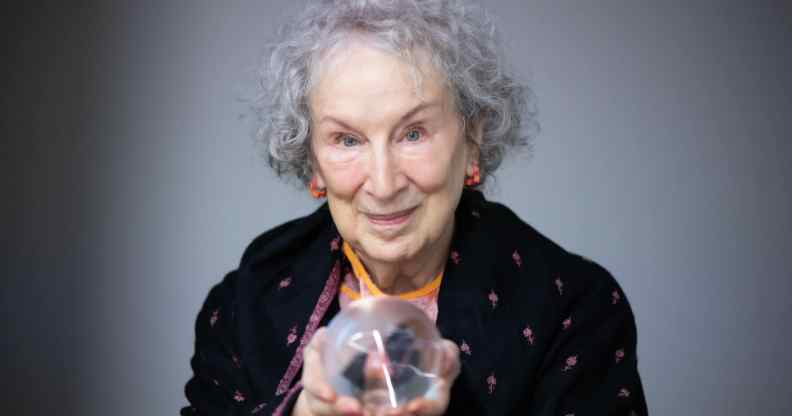Margaret Atwood sparks anger and disappointment with ‘why can’t we say woman’ tweet

Canadian poet Margaret Atwood. (Leonardo Cendamo/Getty Images)
Acclaimed author Margaret Atwood ignited outrage by sharing an article titled: “Why can’t we say ‘woman’ anymore?”
The opinion piece, penned by Toronto Star columnist Rosie DiManno, explores the ongoing conversation around gender-neutral terminology.
DiManno, 65, argued in the piece (which is behind a paywall) that the word woman is “in danger of becoming a dirty word”.
The Handmaid’s Tale author, who has been vocal and unequivocal in her support for trans rights, urged followers “Read her piece. She’s not a TERF.”
Many disagreed, however. Laura Dale, a trans video game journalist, tweeted: “The idea that people are ‘not allowed to say woman’ is an anti-trans dogwhistle,”
“Adding in alternative language as an option is not insisting the word stop being used, or that people can’t use it for themselves.
“It’s a strawman used to imply trans people are making wild demands.”
Non-binary author Amanda Knox tweeted: “I’m disappointed you shared this because it’s factually untrue.
“We can still say ‘woman’ and we can also say ‘people’ when it makes sense to use more inclusive language. I’m non-binary. I also menstruate and gave birth to three kids.
“Saying ‘people with periods’ includes women AND me.”
“Good news, we still can!” added one Twitter user. “Big fan of your fiction on the dangers of enforcing extremely rigid bio-essentialist ideas about gender, btw.”
Atwood, 81, responded to some of her detractors by directing them to read the article before replying.
She also retweeted a user’s comment, saying: “We can say women. And we can say people when that’s more accurate and inclusive. Women are people.”
DiManno wrote in the column: “Certainly there are words — they are slurs mostly — that are no longer acceptable. ‘Woman’ shouldn’t be one of them.
“It shouldn’t leave well-meaning people tongue-tied, lest they be attacked as transphobic or otherwise insensitive to the increasingly complex constructs of gender.”
She continued: “There’s more than a whiff of misogyny to it.
“Why ‘woman’ the no-speak word and not ‘man’? Why not ‘persons who urinate standing up’ or ‘people who eject semen’?”
In one instance, DiManno referred to a widely misreported story about Brighton and Sussex University hospitals in Britain being “told to start using terms such as ‘chest milk’ instead of breast milk”.
The hospital trust actually encouraged staff to use gender-neutral language, such as chest-feeding, where appropriate. A policy document released by BSUH said staff should not stop using gendered words like “woman” or “motherhood”, but should consciously start adding more inclusive language into their lexicon to be inclusive of trans and non-binary patients.
Many non-binary, intersex and trans men, for example, also menstruate, while not all women can give birth, meaning that terms such as “people who menstruate”, “people with a cervix” and “birthing people” are factually accurate.
Indeed, so-called “debates” about gender-inclusive terminology tend to pull focus away from real healthcare issues.
Excluding trans people in gynaecological healthcare can put them at risk of issues such as cervical cancer as some feel such services are inaccessible to them.
“When I say that not only women need this type of healthcare, I’m not trying to invalidate biology, or the experiences of women,” one trans man told PinkNews.
“I’m speaking honestly about who needs access to services and who we must consider when we’re advocating for the policies that will govern how the NHS functions,” they added of Britain’s national healthcare system.
Margaret Atwood has previously been forthcoming in her support for trans people.
“You can believe all you like that trans people aren’t people,” she said in an interview last year, “but it happens not to be a fact.
“It is not true that there are only two boxes. So the two questions to ask about anything are: Is it true? And is it fair?
“So if it’s not true that there are only two gender boxes and gender is fixed and immutable, then is it fair to treat trans people as if they’re not who they say they are?”
PinkNews contacted representatives of Margaret Atwood for comment.

